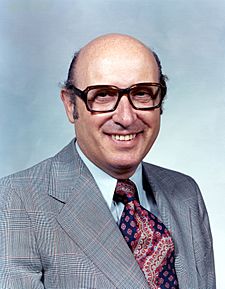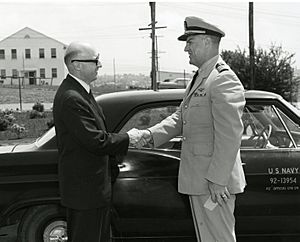Robert A. Frosch facts for kids
Quick facts for kids
Robert Alan Frosch
|
|
|---|---|
 |
|
| 5th Administrator of the National Aeronautics and Space Administration | |
| In office June 21, 1977 – January 20, 1981 |
|
| President | Jimmy Carter |
| Preceded by | James C. Fletcher |
| Succeeded by | James M. Beggs |
| Personal details | |
| Born | May 22, 1928 New York City |
| Died | December 30, 2020 (aged 92) South Hadley, Massachusetts, U.S. |
| Alma mater | Columbia University (BS. MA, PhD) |
| Awards | IRI Medal (1996) IEEE Founders Medal (2001) FREng (1989) |
| Scientific career | |
| Fields | Theoretical Physics |
| Institutions | ARPA United Nations Environmental Program NASA |
| Thesis | Magnetic hyperfine structure in diatomic molecules (1952) |
Robert Alan Frosch (May 22, 1928 – December 30, 2020) was an American scientist. He is best known for being the fifth leader of NASA, the United States space agency. He served as the Administrator of NASA from 1977 to 1981, during the time Jimmy Carter was president.
Contents
Robert Frosch's Early Life and Education
Robert Frosch was born in New York City in 1928. He grew up and went to public schools in The Bronx. He loved learning and went on to study theoretical physics at Columbia University. This is where he earned his bachelor's, master's, and doctorate degrees. Theoretical physics is a field that uses math to understand how the universe works.
Research in Ocean Science
After finishing his studies, Frosch worked as a research scientist. From 1951 to 1963, he was at the Hudson Laboratories of Columbia University. This lab worked with the Office of Naval Research, a part of the U.S. Navy that supports science.
- He studied how sound travels underwater.
- He worked on sonar systems, which use sound waves to detect objects underwater.
- He also researched oceanography, which is the study of the ocean.
- His work included marine geology and marine geophysics, which are about the geology and physics of the ocean floor.
Later, he became the director of these laboratories. He managed about 300 people and two research ships. He also led a big project called Project Artemis, which developed a large experimental sonar system.
Working for the Government
In 1963, Robert Frosch moved to Washington, D.C. He started working for the Advanced Research Projects Agency (ARPA) within the United States Department of Defense. This agency focuses on developing new technologies.
- He directed Project VELA, which was about detecting nuclear tests.
- He then became the deputy director of ARPA, helping to manage many research and development programs.
In 1966, he took on an even bigger role as the Assistant Secretary of the Navy for Research and Development. In this job, he was in charge of all the Navy's programs for research, development, engineering, testing, and evaluation.
From 1973 to 1975, Frosch worked for the United Nations Environment Programme. This is a part of the United Nations that works to protect the environment around the world. He was an Assistant Secretary General, a very important role, and helped manage global environmental programs.
Leading NASA
Robert Frosch became the Administrator of NASA in 1977. While he was in charge, NASA continued to develop the Space Shuttle program. This was a very important time for the program.
- The first Space Shuttle orbiter, named Enterprise, underwent testing.
- These tests happened at NASA's Armstrong Flight Research Center in California.
Frosch left NASA in 1981 when a new presidential administration began.
Later Career and Legacy
After leaving NASA, Robert Frosch became the vice president for research at General Motors. This is a very large car company. He was in charge of their research laboratories.
- In 1985, he received the Maurice Holland Award for a paper he wrote.
- In 1996, he was honored with the IRI Medal for his leadership at General Motors.
Even after he retired, he stayed involved in science and technology. He was a senior research fellow at the Kennedy School of Government at Harvard University. He also worked as a guest investigator at the Woods Hole Oceanographic Institution, which studies the ocean.
Robert Frosch was recognized for his contributions to engineering when he was appointed an International Fellow of the Royal Academy of Engineering in 1989.
He passed away on December 30, 2020, in South Hadley, Massachusetts, at the age of 92, after a long illness.
 | James B. Knighten |
 | Azellia White |
 | Willa Brown |


